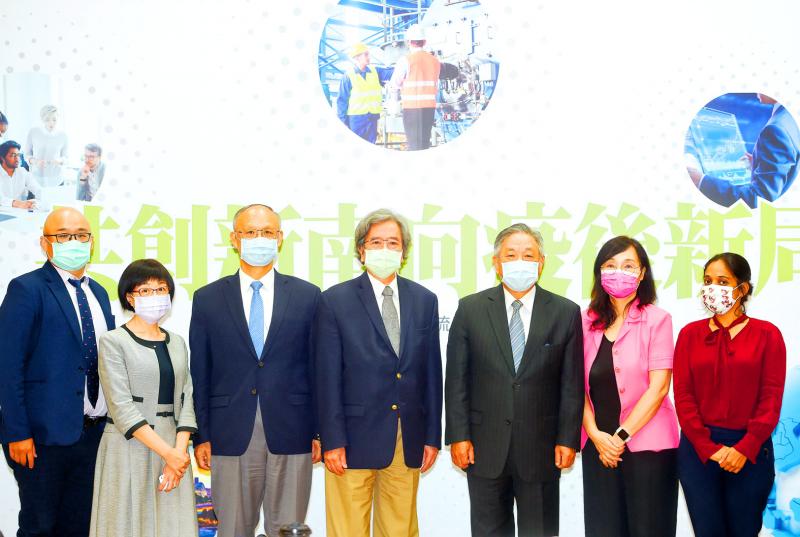A forum in Taipei on Friday discussed the future of the nation’s New Southbound Policy in a post-COVID-19 world.
The policy, introduced in 2016, aims to boost interactions between Taiwan, ASEAN and South Asian nations in human resources, industry, investment, education, culture, tourism and agriculture.
Taiwan should find ways to enhance its strategic importance in the Indo-Pacific region, in addition to attracting economic investment and encouraging talent exchanges, Deputy Minister of Foreign Affairs Tien Chung-kwang (田中光) told the forum, which was initiated by the Taiwan-Asia Exchange Foundation and hosted by the Chinese-language Liberty Times (sister newspaper of the Taipei Times).

Photo: Fang Pin-chao, Taipei Times
The New Southbound Policy should be more compatible with policies enacted by other countries in the region, especially as the international community turns its attention toward the Indo-Pacific region amid growing concern about stability in the Taiwan Strait area, he said.
ASEAN policies are focused on strengthening its bloc, while Taiwan’s regional policies are geared more toward trade, education and fostering talent, Tien said, adding that it is perhaps time for Taiwan to discuss how to broaden its scope and view in the region.
Citing how the Quadrilateral Security Dialogue in March included climate change, vaccines and emerging technologies, he said that regional policies should not become overly focused on military issues.
“It is of utmost importance that Taiwan’s New Southbound Policy find ways to connect with this trend,” Tien said.
One option is to expand Taiwan’s Global Cooperation and Training Framework collaboration with the US and Japan, he said.
Taiwan has worked with the US under the framework since 2015, holding more than 30 international seminars in fields such as public health, law enforcement, disaster relief, energy cooperation, women’s empowerment, the digital economy, cybersecurity and media literacy, attracting 2,500 attendees from more than 90 countries, he said.
Such fields correspond with the government’s New Southbound Policy, he added.
Minister Without Portfolio John Deng (鄧振中) said that Taiwan could attract students from the 18 countries included in the policy, to mitigate the impact of the nation’s declining birthrate.
The Ministry of Health and Welfare’s relaxation of regulations for the medical industry could also lead to growth, especially with innovations in telemedicine, he said.
Taiwan should also step up its investments in Southeast Asia to benefit from the reorganization of the global supply chain, he said.
Non-governmental organizations such as the Taiwan-Asia Exchange Foundation can play a role in the policy’s influence, as foundations have a wider reach than the government, Deng said.
Foundation chairman Michael Hsiao (蕭新煌), who is also a presidential adviser, said that government units and the private sector, led by the foundation, should meet at the end of this year to discuss a new direction for the policy.

The Mainland Affairs Council (MAC) today condemned the Chinese Communist Party (CCP) after the Czech officials confirmed that Chinese agents had surveilled Vice President Hsiao Bi-khim (蕭美琴) during her visit to Prague in March last year. Czech Military Intelligence director Petr Bartovsky yesterday said that Chinese operatives had attempted to create the conditions to carry out a demonstrative incident involving Hsiao, going as far as to plan a collision with her car. Hsiao was vice president-elect at the time. The MAC said that it has requested an explanation and demanded a public apology from Beijing. The CCP has repeatedly ignored the desires

Many Chinese spouses required to submit proof of having renounced their Chinese household registration have either completed the process or provided affidavits ahead of the June 30 deadline, the Mainland Affairs Council (MAC) said on Thursday. Of the 12,146 people required to submit the proof, 5,534 had done so as of Wednesday, MAC deputy head and spokesperson Liang Wen-chieh (梁文傑) said. Another 2,572 people who met conditions for exemption or deferral from submitting proof of deregistration — such as those with serious illnesses or injuries — have submitted affidavits instead, he said. “As long as individuals are willing to cooperate with the legal

The Ma-anshan Nuclear Power Plant’s license has expired and it cannot simply be restarted, the Executive Yuan said today, ahead of national debates on the nuclear power referendum. The No. 2 reactor at the Ma-anshan Nuclear Power Plant in Pingtung County was disconnected from the nation’s power grid and completely shut down on May 17, the day its license expired. The government would prioritize people’s safety and conduct necessary evaluations and checks if there is a need to extend the service life of the reactor, Executive Yuan spokeswoman Michelle Lee (李慧芝) told a news conference. Lee said that the referendum would read: “Do

Taiwan's Vice President Hsiao Bi-khim (蕭美琴) said Saturday that she would not be intimidated by the Chinese Communist Party (CCP), following reports that Chinese agents planned to ram her car during a visit to the Czech Republic last year. "I had a great visit to Prague & thank the Czech authorities for their hospitality & ensuring my safety," Hsiao said on social media platform X. "The CCP's unlawful activities will NOT intimidate me from voicing Taiwan's interests in the international community," she wrote. Hsiao visited the Czech Republic on March 18 last year as vice president-elect and met with Czech Senate leadership, including